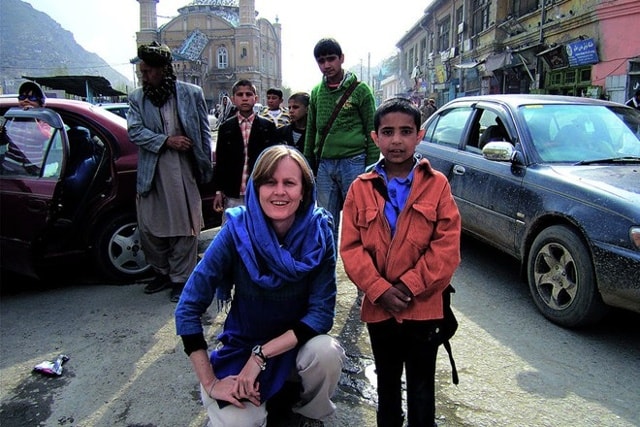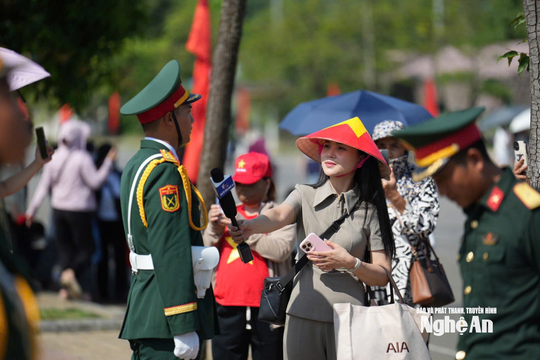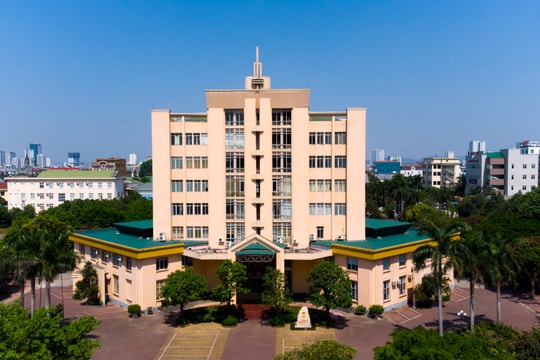Female reporter traumatized after witnessing many painful scenes
After a long reporting stint in Afghanistan, ABC News reporter Sally Sara suffered from post-traumatic stress disorder (PTSD). Sally wrote a touching story about her journey through PTSD and returning to normal life.
Sally said that normally she would write an article like this in just an hour or two, but it took her three weeks to write the article about her own experience with PTSD.
She said that perhaps this is a common story of a reporter who worked on the battlefield, finished his mission and returned home.
Here is Sally Sara's story:
When I first came back from Afghanistan, I was happy with everything. The joy of being back was endless.
 |
| A photo of Sally taking of children at a school in Afghanistan. |
However, that gradually disappeared. I often felt empty at home. That feeling made me distant from everyone. I felt like an outsider.
I was always afraid that I would be attacked, even though it never happened. It was frustrating not being able to continue reporting on the injustices happening in Afghanistan.
A few months later, in October 2012, things took a turn for the worse.
There were mornings when I couldn’t even make out the faces of the people on the train. Everything around me was blurry. I felt like I wasn’t there anymore. I couldn’t concentrate on work either. At home, I couldn’t do simple things like call the bank or sort out bills.
When I was in Afghanistan, I was very careful. Every few months I would call ABC to summarize what I had seen and experienced. I took good care of myself and was very professional when I was in the field. I was calm, determined and very focused. I was calm even when I heard bombs and gunfire. Maybe too calm.
But deep down, beyond what I could feel, something was wrong. And the worst thing happened on November 1, 2012.
 |
| ABC News reporter Sally Sara. |
That morning, after I woke up, I didn't know what to do next. I didn't know what happened that day. But looking back now, I can understand.
Everyone has a limit. No matter how much you have seen, how experienced you are, how careful you are. It is an instinctive reaction when you have spent so many years as a witness.
I spent over 8 years in the field, often covering horrific scenes. You may be able to handle more than I did, or you may not be able to last more than a month. Who knows? Everyone has their limits. The problem is you don’t know where your limits are until you hit them.
What happened that day is known only to me, my family and my close friends. I don't want to tell it. Partly because I'm still very scared, partly because I'm still a journalist.
All I can say is that day was horrible. I had thoughts, confusion, fear that was beyond any emotion I had ever experienced in my life. It scared me more than anything on the battlefield. I don't know and don't even have words to describe that feeling.
The next few days I was in shock and trauma. I felt so sad and ashamed that I had fallen. It’s a painful feeling when you realize you’re not as strong as you thought you were. I kept thinking, this will last a lifetime. I was afraid I might lose my job.
But then I went to see a psychologist. Things started to change. The doctor was an older woman with many years of experience, especially with reporters with PTSD like me. She was very nice and trustworthy. On the first day of treatment, I was able to walk home and feel saved.
She explained that what I was going through was the result of having witnessed so many traumatic events over the years. I now understand that we humans have a deep aversion or fear of threats to our survival. When you go against that instinct, over and over again, year after year, it will hurt you and one day it will come back and “attack” you. That is exactly what happened to me.
It's not just me, it's a common condition. War correspondents are more susceptible to PTSD than other colleagues. The longer they stay in the field, the worse it gets. Independent reporters are at even higher risk.
One important thing to note is the delay in PTSD. It can appear months or years after the trauma. In my case, it was 11 months after returning from Afghanistan.
One of the misconceptions about PTSD is that it is all about blood, bullets, and fear. However, it is much more complex. Mental health professionals use the term “moral trauma.” This means that you are traumatized by emotional pain. For example, when you see a child being injured or killed. The guilt and remorse you feel when you can’t help. That feeling can haunt you for the rest of your life if you don’t get help.
As journalists, I think we should celebrate colleagues who push themselves beyond their limits. We celebrate courage, taking risks. But we don’t give enough credit to those who say “no,” those who say “I’ve had enough.” Sometimes the bravest thing to do is to ask for help and know when to stop. I wish young journalists knew how to say no when necessary.
I quietly returned to work after a few weeks of depression. It was a very strange experience. I tried to live as if nothing had happened. Because my experience with PTSD was still a pain that I wanted to keep to myself.
Over the weeks and months that followed, I began to tell some of my closest colleagues what had happened. I also gradually opened up to senior ABC managers. Talking changed everything, and I felt less ashamed.
For me, life now is always full of joy, many interesting things. The shadow of war has receded.
Content is made through reference to ABC News, the most trusted news agency in Australia.
According to Infonet
| RELATED NEWS |
|---|








